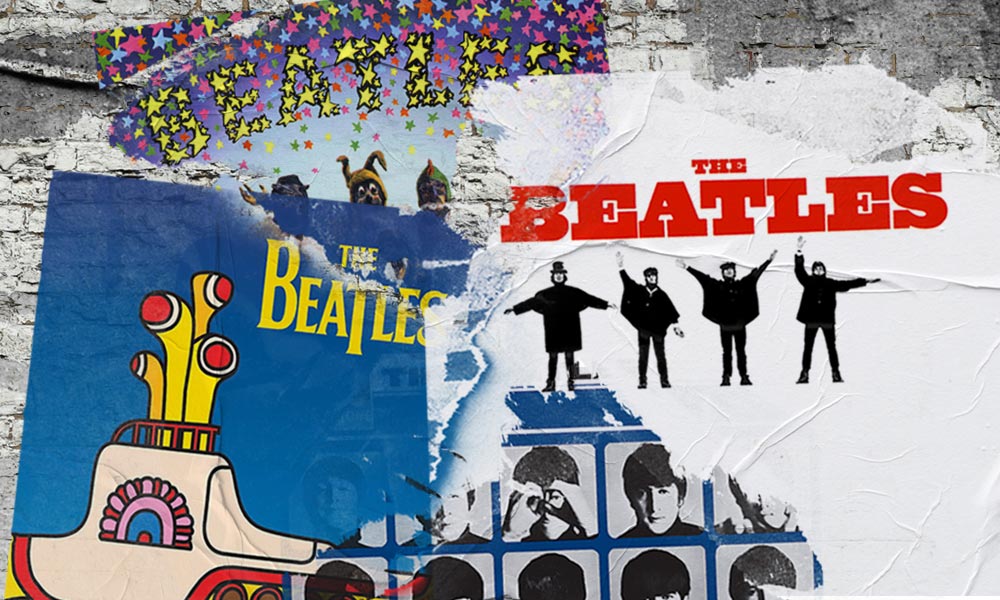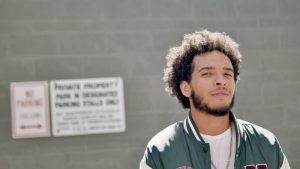The Beatles will be forever revered for their remarkable albums and hit singles. However, the musicians from Liverpool also made a lasting contribution to the world of cinema. Across five highly influential Beatles movies – A Hard Day’s Night (1964), Help! (1965), Magical Mystery Tour (1967), Yellow Submarine (1968) and Let It Be (1970) – the group helped make irreverence fashionable in mainstream culture.
The Beatles’ movies paved the way for future blockbusters, including the film Yesterday. Danny Boyle’s comedy is, however, just the latest in a series of films which have been inspired by the music and movie careers of The Beatles.
A Hard Day’s Night and Help!
In the 2007 comedy Walk Hard: The Dewey Cox Story, John C. Reilly stars as a boy from Alabama who grows up to take America by storm with his rock’n’roll career. Paul Rudd appears as John Lennon, Jack Black as Paul McCartney, Justin Long as George Harrison, and Jason Schwartzman as Ringo Starr, and one of the highlights of the film is the witty scene in which Dewey Cox takes an LSD trip with The Beatles in India.
Long admitted that he and Schwartzman were “freaking out with nerves” about portraying such “sacred musicians” on screen. Black, who had made his name in School Of Rock – another light-hearted music movie that owes something to the frothiness of The Beatles’ films of the 60s – told his fellow actors not to be nervous. “Dudes, just watch A Hard Day’s Night,” advised the Golden Globe-nominated star.
Decades before, Alun Owen had earned an Oscar nomination for his screenplay for A Hard Day’s Night, the United Artists’ film that portrayed 36 hours in the lives of the group who had made Beatlemania a global phenomenon. The movie, which was in stark contrast to Cliff Richard’s “clean teens” films, was improvisational and imaginative. Director Richard Lester’s film captures the fun, spontaneity, and unforgettable music of the rock group as they journeyed from Liverpool to London.
The film was a financial and critical success. Influential critic Leslie Halliwell, who described the movie as a “comic fantasia with music”, said A Hard Day’s Night “led directly to all the kaleidoscopic swinging London spy thrillers and comedies of the later 60s.” The film was immediately imitated by Gerry And The Pacemakers in Ferry Cross The Mersey (1965), and inspired The Monkees’ hugely popular television series in America. Three decades later, A Hard Day’s Night was cited as an influence on Spice Girls’ movie, Spice World.
The sequence in the film featuring the song “Can’t Buy Me Love,” during which The Beatles cavort around a field, is arguably one of the earliest music videos. Some of the techniques – such as cutting the images to the beat of the music – were still being copied decades later, on promo videos made for MTV.
For many musicians growing up in the 60s, The Beatles’ zany films made an indelible impression. New York Times film critic Bosley Crowther described Help! – the second collaboration with distributor United Artists and director Lester – as “90 crowded minutes of good, clean insanity.” The scene in which the four musicians practice skiing in the Austrian Alps (while “Ticket To Ride” plays) was full of innovative jump frames and quick cuts. Help! was made on a grander scale than A Hard Day’s Night, shot in color and with a bigger budget.
Let It Be, 2021
After the success of their first two movies, The Beatles decided to take control of their own film careers. With Magical Mystery Tour, Yellow Submarine and Let It Be, they turned to styles and modes of production more attuned to their musical sensibilities. Let It Be features the famous unplanned rooftop concert, shot on a freezing day on the roof of Apple Studios in London. In all, more than 55 hours of in-studio footage was also filmed by director Michael Lindsay-Hogg. Peter Jackson, of Lords Of The Rings fame, is using the extra footage to direct a new version that will come out in 2021. “The 55 hours of never-before-seen footage and 140 hours of audio made available to us ensure this movie will be the ultimate ‘fly on the wall’ experience that Beatles fans have long dreamt about,” Jackson said. “It’s like a time machine transports us back to 1969, and we get to sit in the studio watching these four friends make great music together.”
Yellow Submarine
Yellow Submarine, the first full-length feature cartoon that had been made in the UK since 1954’s Animal Farm (1954), was also hugely influential. The script, which was co-written by Merseyside poet Roger McGough, is full of humor and puns. When Frankenstein appears, for example, drummer Starr jokes that he used to “go out with his sister, Phyllis.”
Czechoslovakian animator Heinz Edelmann, who said he was influenced by the cartoon work of jazz musician and artist Wally Fawkes (aka Trog) and his cartoon-strip character Flook, devised some brilliant psychedelic animations that helped shape the plot of the film. The movie paved the way for feature-length cartoons from other studios, including Ralph Bakshi’s Fritz The Cat (1972) and later work from Terry Gilliam and Alan Aldridge.
John Lassester, the director of Toy Story and former chief creative officer of Pixar and Walt Disney Animation, described Yellow Submarine as a “revolutionary work” that helped “pave the way for the fantastically diverse world of animation that we all enjoy today.” Josh Weinstein, a writer for The Simpsons, said the film “gave birth to modern animation” and that its subversive humor led to classics such as South Park and the DreamWorks movie Shrek.
The Beatles movie that promised to be the most subversive of all, however, never saw the light of day. Playwright Joe Orton’s proposed screenplay, Up Against It, which was set to feature a scene in which the Fab Four dressed as women, was greeted enthusiastically by Brian Epstein before the project was dropped. Orton, author of Loot and Entertaining Mr. Sloane, was given a £1,000 “kill fee” for his script.
Legacy of The Beatles’ movies
Among the films that Richard Lester went on to make after A Hard Day’s Night and Help! was the black comedy How I Won The War, in which Lennon played the part of Gripweed. The film’s title echoed a line from The Beatles’ song “A Day In The Life” (“I saw a film today, oh, boy/The English army had just won the war”), and that line provided the title of a book by Professor Jörg Helbig, published by Germany’s Schüren Verlag in March 2016, called I Saw A Film Today, Oh Boy! Enzyklopädie Der Beatlesfilme.
Helbig, who writes about those five Beatles films, argues that 200 other movies were directly inspired by the cinema exploits of the band. His list includes television comedies such as Alison Steadman’s Little Cracker, about her visit to the Cavern Club in 1962, and the horror mockumentary The Zombeatles: All You Need Is Brains.
One celebrated film inspired by The Beatles was 1978’s Sgt Pepper’s Lonely Hearts Club Band, which featured an eclectic cast including Bee Gees, Peter Frampton, Aerosmith, Earth, Wind & Fire, Steve Martin, and Donald Pleasance. I Wanna Hold Your Hand, a coming-of-age story about the Beatles that was made the same year, was the first film to have Steven Spielberg as executive producer.
With Rock’n’Roll High School (1979), an exuberant celebration of teenage rebellion, director Allan Arkush said he was trying to recapture some of the feeling of enthusiasm he had as a young Beatles fan. US punk band Ramones even show up to join in the fun – leading to the memorable line, “Do your parents know you’re Ramones?”
Numerous great music movies which owe something to the cinematic influence of The Beatles include School Of Rock, The Blues Brothers and This is Spinal Tap. The Beatles have also inspired serious dramas (Secrets, 1992; I Am Sam, 2001), and musicals such as Across The Universe (2007). There was also outright parody in The Rutles: All You Need Is Cash (1978). The cult mockumentary followed Beatles-like band The Rutles, with Eric Idle playing Dirk McQuickly, a thinly-veiled parody of McCartney, and Neil Innes (Ron Nasty) lampooning Lennon, whose character even holds a “bath-in” for peace. There are cameos by Mick Jagger, Paul Simon and even Beatles star George Harrison, who plays a roving BBC reporter. In 2003, a sequel was made called The Rutles 2: Can’t Buy Me Lunch.
As well as The Beatles’ own productions, the band’s influence on cinema was felt in other ways. McCartney wrote some great songs for films, including Vanilla Sky and his Oscar-nominated James Bond theme “Live And Let Die.” Harrison, meanwhile, financed the film company HandMade Films, which was responsible for such gems as Life Of Brian and Withnail And I.
A recent film to have a Beatles lineage is Boyle’s Yesterday, which had its world premiere at the 2019 Tribeca Film Festival. The movie, which is based on a story by Jack Barth and has a screenplay by Richard Curtis – a Beatles fan who appears in Ron Howard’s documentary The Beatles: Eight Days A Week – tells the story of Jack Malik, a struggling singer-songwriter who wakes up to realize he is the only person on earth who can remember The Beatles and their songs. Malik (played by Himesh Patel) spots an opportunity for fame and wealth, and starts claiming The Beatles’ songs as his own. The film also stars Lily James and has a cameo appearance from Ed Sheeran, a Beatles fan, who suggests that Patel’s character re-works “Hey Jude” into “Hey Dude.”
Yesterday demonstrates again that The Beatles’ remarkable music lives on. Their film career will continue to inspire, too, not least because of the authenticity and humor of a young trailblazing band that was captured so richly for cinema audiences.
“I did my best to show on screen what had impressed me so much about them,” said Lester. “To recreate their ‘all for one and one for all’ attitude.”
Looking for more? Discover The Beatles songs in the Yesterday movie.




